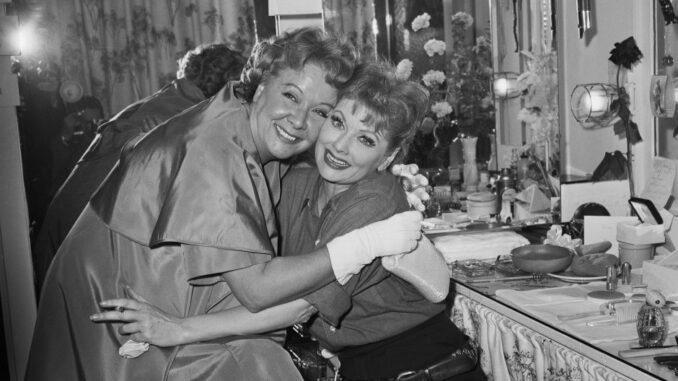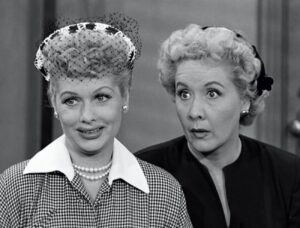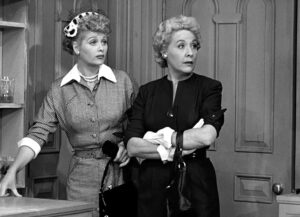
When we think of classic television, few shows come to mind as quickly as I Love Lucy. The iconic comedy series, starring Lucille Ball and Desi Arnaz, was groundbreaking in many ways. But beyond the laughter, there were many behind-the-scenes stories that often stayed hidden from the public. One such story revolves around Vivian Vance, who played Ethel Mertz, and a peculiar contract requirement that demanded she weigh 10 pounds more than Lucille Ball.
This revelation sheds light on the pressures placed on actresses of that era to conform to specific body standards—standards that were often unfair and rooted in Hollywood’s rigid beauty ideals. In this article, we’ll explore why this contractual clause existed, how it affected Vivian Vance, and what it reveals about the entertainment industry during that time.

The Rise of ‘I Love Lucy’ and Its Cultural Impact
When I Love Lucy first aired in 1951, it took the world by storm. Lucille Ball’s quick wit and physical comedy, paired with Desi Arnaz’s charm, made the show a massive hit. The chemistry between the two leads was palpable, but the dynamic between Lucy and her best friend, Ethel Mertz, added another layer of humor and heart to the show.
Who Was Vivian Vance?
Vivian Vance wasn’t just a sidekick to Lucille Ball. Born in 1909 in Cherryvale, Kansas, Vance had a successful career in theater before transitioning to television. Her portrayal of Ethel Mertz made her a household name, and she became a beloved figure in the American entertainment landscape.
However, despite her success, Vance faced numerous challenges in Hollywood, particularly due to the pressures placed on women in the industry.
The Unwritten Rules of Hollywood Beauty
Hollywood in the 1950s was a place where looks often mattered more than talent. Actresses were expected to maintain a certain physique, and those who didn’t fit the mold faced challenges in getting roles. This obsession with appearance was especially harsh for women, who were constantly judged based on their weight, complexion, and overall attractiveness.
Vivian Vance’s Contract Clause: More Than Just Weight
One of the most startling revelations about I Love Lucy was that Vivian Vance was contractually required to weigh 10 pounds more than Lucille Ball. But why was this clause included in her contract? Was it simply a matter of aesthetics, or was there a deeper reasoning behind it?
Lucille Ball’s Influence on the Contract
Lucille Ball was not only the star of the show but also one of its producers. While the contract clause might seem cruel, it’s essential to consider the context. Ball, being the leading lady, was likely expected to be the more glamorous and conventionally attractive figure on the show. By having Ethel, played by Vance, appear heavier, the contrast between the two characters would be more pronounced, enhancing the comedic dynamic between Lucy and Ethel.
How Did Vivian Vance Feel About the Weight Clause?

It’s no secret that Vance wasn’t thrilled about the clause in her contract. She was a talented actress with a successful career, and being asked to conform to a specific body standard must have been demeaning. In interviews, she often expressed frustration over the way Hollywood treated actresses, especially when it came to their appearance.
Body Image Pressures in the 1950s
The 1950s was a time when women were held to strict beauty standards, and those who didn’t fit the mold were often ridiculed or dismissed. Actresses like Marilyn Monroe, Elizabeth Taylor, and Audrey Hepburn were revered for their beauty, but they also faced immense pressure to maintain their image.
For someone like Vance, who was in her 40s when I Love Lucy began, the pressure to maintain a specific body type must have been even more intense. The fact that her weight was written into her contract is a testament to how pervasive these standards were.
The Unfairness of Hollywood’s Double Standards
It’s important to note that while Vance was pressured to weigh more, her male co-stars were not subjected to the same scrutiny. Hollywood has long been known for its double standards when it comes to men and women’s appearances. While actresses were expected to look a certain way, male actors were often given more leeway.
Ethel and Lucy: The Real-Life Friendship
Despite the weight clause and the pressures of working in Hollywood, Vivian Vance and Lucille Ball shared a close friendship. While their characters may have bickered on-screen, off-screen, the two actresses had a deep bond. In many ways, their friendship mirrored the one portrayed on the show, with Lucy and Ethel’s loyalty and camaraderie shining through even the toughest of situations.
How Did the Contract Affect Vance’s Career?
While Vance’s role as Ethel Mertz made her a star, the weight clause in her contract likely had a lasting impact on her self-esteem. Hollywood’s obsession with appearance didn’t just affect Vance—it affected many actresses of that era, leading to feelings of inadequacy and frustration.
Despite these challenges, Vance continued to have a successful career, both on television and in theater. Her portrayal of Ethel remains iconic to this day, and she is remembered as one of the greatest comedic actresses of all time.
The Legacy of ‘I Love Lucy’
I Love Lucy remains one of the most beloved sitcoms of all time, and its legacy continues to influence television today. The show broke new ground in many ways, from its innovative use of multi-camera setups to its portrayal of a real-life married couple on screen.
However, the behind-the-scenes stories, such as Vivian Vance’s contract clause, reveal a darker side of Hollywood. These stories remind us of the immense pressure placed on women in the industry and the often-unfair standards they were held to.
How Hollywood’s Standards Have Changed
While Hollywood has come a long way since the 1950s, many of the same pressures remain. Actresses today still face scrutiny over their appearance, though there has been a growing movement towards body positivity and inclusivity in the industry.
What Can We Learn from Vivian Vance’s Story?
Vivian Vance’s experience on I Love Lucy serves as a reminder of the importance of challenging societal standards, especially those that are harmful or demeaning. It’s crucial to remember that talent and character are far more important than appearance, a lesson that is just as relevant today as it was in the 1950s.
Conclusion
Vivian Vance’s contract clause requiring her to weigh more than Lucille Ball is a reflection of the rigid and often unfair beauty standards of Hollywood in the 1950s. Despite this, Vance’s talent shone through, and she remains an iconic figure in television history. Her story serves as a reminder of the pressures faced by women in the entertainment industry and the need for continued progress toward more inclusive and fair representation.